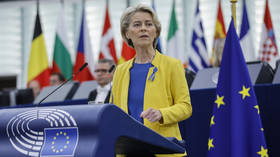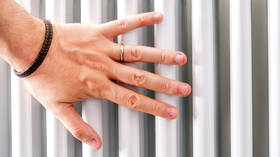EU chief suggests way to avoid future gas troubles

The EU plans to come up with new natural gas policies that will differentiate suppliers by their perceived reliability, Ursula von der Leyen has told lawmakers.
“We will develop with the member states a set of measures to take into account the specific nature of our relationship with suppliers, ranging from unreliable suppliers such as Russia to reliable friends,” the European Commission president said in a keynote speech to the European Parliament on Wednesday.
Von der Leyen blasted Russia as a supposedly bad actor and touted as a major achievement of her tenure the reduction of Russian gas in the EU energy mix from 40% last year down to 9% today. She identified nations such as the US, Norway, and Algeria as “friends” that are replacing Russia in the European market.
Meanwhile, Moscow is “actively manipulating” the EU market, von der Leyen claimed, and prefers “to flare the gas instead of sending it to Europe.” This means that the market “is not functioning anymore,” she argued.
The European Commission previously mulled introducing a price cap for imported gas, but reportedly rejected the idea after Russia said it would not sell hydrocarbons to any customer that tries to dictate the price. Moscow said such a policy would apply to possible restrictions on the trade of Russian oil, which G7 nations are trying to enforce by threatening to punish any buyers of Russian crude willing to pay more than what the US and its allies deem appropriate.
The part of von der Leyen’s annual state of the union speech that mentioned possible discrimination among gas suppliers suggested that such measures would help lower gas prices. She said there was progress in talks with Norway on reducing the price of its supplies “in a reasonable manner.” Affordable energy was necessary for EU businesses to be competitive in the global market, the official stressed.
She outlined a number of energy-saving and cost-compensating measures that the European Commission has developed for member states to introduce. In particular, energy producers in Europe will be hit with a windfall tax, von der Leyen said, arguing that it was “wrong to receive extraordinary record revenues and profits” amid the crisis.
“In these times, profits must be shared and channeled to those who need it most,” she stressed.
Russian Foreign Ministry spokeswoman Maria Zakharova reacted to the speech by suggesting that the EU was switching from a “green” agenda to a communist “red” one. “The only thing left is for the proletariat of all the nations to unite, and it will be time to raise Lenin,” she joked in a social media post.













